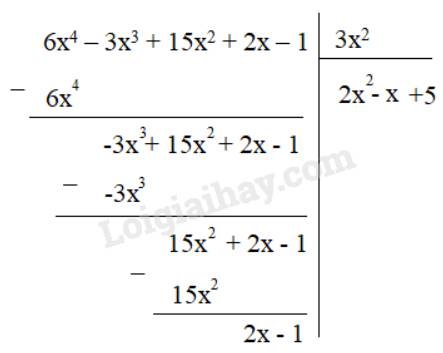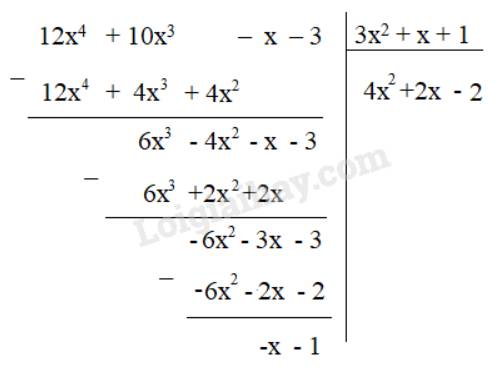Hãy nhập câu hỏi của bạn vào đây, nếu là tài khoản VIP, bạn sẽ được ưu tiên trả lời.

Ta có: x=100
nên x+1=101
Ta có: \(f\left(x\right)=x^8-101x^7+101x^6-101x^5+...+101x^2-101x+25\)
\(=x^8-x^7\left(x+1\right)+x^6\left(x+1\right)-x^5\left(x+1\right)+...+x^2\left(x+1\right)-x\left(x+1\right)+25\)
\(=x^8-x^7-x^7+x^7+x^6-x^6-x^5+x^5-x^4+...+x^3+x^2-x^2-x+25\)
\(=-x+25\)
\(=-100+25=-75\)

Câu a, Gợi ý thôi nhé
\(f\left(x\right)=\frac{\left(f\left(x\right)+g\left(x\right)\right)+\left(f\left(x\right)-g\left(x\right)\right)}{2}\)
và \(g\left(x\right)=\frac{\left(f\left(x\right)+g\left(x\right)\right)-\left(f\left(x\right)-g\left(x\right)\right)}{2}\)
thay biểu thức trên vào là ra nhé
b, Chú ý: f(100) sẽ có x-100=0 nhé, nên em tách các số ra sao cho có chứa x-100 để nó bằng 0 nhé
ví dụ: \(x^8-100x^7=x^7\left(x-100\right)\), các chỗ khác tách tương tự, đề này em gõ anh nghĩ bị sai đề ròi nhé

1) f(x)=1008 - (100+1)*1007 + (100+1)*1006 - .........- (100+1)100+125
=1008 - 1008 - 1007+1007 + 1006 - ......-1002 - 100+125
=25

`a,`
`F(x)=4x^4-2+2x^3+2x^4-5x+4x^3-9`
`F(x)=(2x^4+4x^4)+(2x^3+4x^3)-5x+(-2-9)`
`F(x)=6x^4+6x^3-5x-11`
`b,`
`K(x)=F(x)+G(x)`
`K(x)=(6x^4+6x^3-5x-11)+(6x^4+6x^3-x^2-5x-27)`
`K(x)=6x^4+6x^3-5x-11+6x^4+6x^3-x^2-5x-27`
`K(x)=(6x^4+6x^4)+(6x^3+6x^3)-x^2+(-5x-5x)+(-11-27)`
`K(x)=12x^4+12x^3-x^2-10x-38`
`c,`
`H(x)=F(x)-G(x)`
`H(x)=(6x^4+6x^3-5x-11)-(6x^4+6x^3-x^2-5x-27)`
`H(x)=6x^4+6x^3-5x-11-6x^4-6x^3+x^2+5x+27`
`H(x)=(6x^4-6x^4)+(6x^3-6x^3)+x^2+(-5x+5x)+(-11+27)`
`H(x)=x^2+16`
Đặt `x^2+16=0`
Ta có: \(x^2\ge0\text{ }\forall\text{ }x\)
`->`\(x^2+16\ge16>0\text{ }\forall\text{ }x\)
`->` Đa thức `H(x)` vô nghiệm.

a) Ta có:
f(0) = -2.03 + 3.02 - 0 + 5 = 0 + 0 - 0 + 5 = 5
g(-1) = 2.(-1)3 - 2.(-1)2 + (-1) - 9 = -2 - 2 - 1 - 9 = -14
b) f(x) + g(x) = (-2x3 + 3x2 - x + 5) + (2x3 - 2x2 + x - 9)
= -2x3 + 3x2 - x + 5 + 2x3 - 2x2 + x - 9
= (-2x3 + 2x3) + (3x2 - 2x2) - (x - x) + (5 - 9)
= x2 - 4
f(x) - g(x) = (-2x3 + 3x2 - x + 5) - (2x3 - 2x2 + x - 9)
= -2x3 + 3x2 - x + 5 - 2x3 + 2x2 - x + 9
= -(2x3 + 2x3) + (3x2 + 2x2) - (x + x) + (5 + 9)
= -4x3 + 5x2 - 2x + 14

Bài 2:
x=100 nên x+1=101
\(f\left(x\right)=x^8-x^7\left(x+1\right)+x^6\left(x+1\right)-x^5\left(x+1\right)\)
\(=x^8-x^8-x^7+x^7+x^6-x^6-x^5\)
\(=-x^5=-100^5\)

Bài 1
Gợi ý bạn làm : Bạn thay \(x=-4;x=-3;x=0;x=1\) vào \(f\left(x\right);g\left(x\right)\)
\(\Rightarrow\) Nếu kết quả ra giống nhau thì là nghiệm , ra khác nhau thì không là nghiệm
VD : Thay \(x=-4\) vào \(f\left(x\right)\) và \(g\left(x\right)\)
\(f\left(-4\right)=4.\left(-4\right)^4-5\left(-4\right)^3+3.\left(-4\right)+2=1334\)
\(g\left(x\right)=-4.\left(-4\right)^4+5\left(-4\right)^3+7=-1337\)
Ra hai kết quả khác nhau
\(\Rightarrow x=-4\) không là nghiệm
Bài 2
\(f\left(x\right)-g\left(x\right)=\left(-x^5+3x^2+4x+8\right)-\left(-x^5-3x^2+4x+2\right)\\ =-x^5+3x^2+4x+8+x^5+3x^2-4x-2\\ =\left(-x^5+x^5\right)+\left(3x^2+3x^2\right)+\left(4x-4x\right)+\left(8-2\right)\\ =6x^2+6\\ =x^2+1\\ =x^2+2.\dfrac{1}{2}x+\dfrac{1}{4}+\dfrac{3}{4}\\ =\left(x+\dfrac{1}{2}\right)^2+\dfrac{3}{4}>0\forall x\)
\(\Rightarrow\) phương trình vô nghiệm

a)

Thương Q(x) = 2x2 – x + 5
Dư R(x) = 2x – 1
Ta có: F(x) = 3x2 . (2x2 – x + 5) + 2x – 1
b)

Thương Q(x) = 4x2 + 2x – 2
Dư R(x) = -x – 1
Ta có: F(x) = (3x2 + x + 1) . (4x2 + 2x – 2) – x – 1
Bài 1:
\(f\left(x\right)+g\left(x\right)=6x^4-3x^2-5\)
\(f\left(x\right)-g\left(x\right)=4x^4-6x^3+7x^2+8x-9\)
Do đó: \(2\cdot f\left(x\right)=10x^4-6x^3+4x^2+8x-14\)
=>\(f\left(x\right)=5x^4-3x^3+2x^2+4x-7\)
\(g\left(x\right)=5x^4-3x^3+2x^2+4x-7-4x^4+6x^3-7x^2-8x+9\)
\(=x^4+3x^3-5x^2-4x+2\)